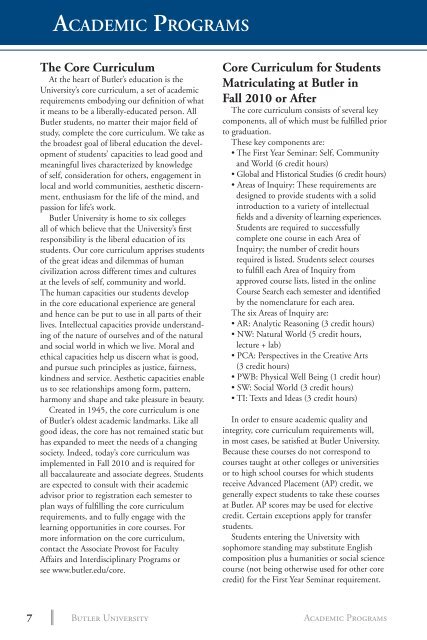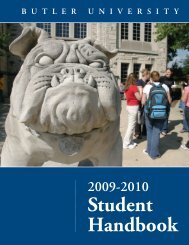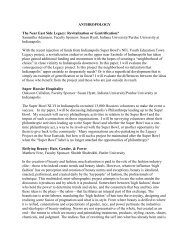2 0 1 3 bulletin - Butler University
2 0 1 3 bulletin - Butler University
2 0 1 3 bulletin - Butler University
Create successful ePaper yourself
Turn your PDF publications into a flip-book with our unique Google optimized e-Paper software.
Academic Programs<br />
The Core Curriculum<br />
At the heart of <strong>Butler</strong>’s education is the<br />
<strong>University</strong>’s core curriculum, a set of academic<br />
requirements embodying our definition of what<br />
it means to be a liberally-educated person. All<br />
<strong>Butler</strong> students, no matter their major field of<br />
study, complete the core curriculum. We take as<br />
the broadest goal of liberal education the development<br />
of students’ capacities to lead good and<br />
meaningful lives characterized by knowledge<br />
of self, consideration for others, engagement in<br />
local and world communities, aesthetic discernment,<br />
enthusiasm for the life of the mind, and<br />
passion for life’s work.<br />
<strong>Butler</strong> <strong>University</strong> is home to six colleges<br />
all of which believe that the <strong>University</strong>’s first<br />
responsibility is the liberal education of its<br />
students. Our core curriculum apprises students<br />
of the great ideas and dilemmas of human<br />
civilization across different times and cultures<br />
at the levels of self, community and world.<br />
The human capacities our students develop<br />
in the core educational experience are general<br />
and hence can be put to use in all parts of their<br />
lives. Intellectual capacities provide understanding<br />
of the nature of ourselves and of the natural<br />
and social world in which we live. Moral and<br />
ethical capacities help us discern what is good,<br />
and pursue such principles as justice, fairness,<br />
kindness and service. Aesthetic capacities enable<br />
us to see relationships among form, pattern,<br />
harmony and shape and take pleasure in beauty.<br />
Created in 1945, the core curriculum is one<br />
of <strong>Butler</strong>’s oldest academic landmarks. Like all<br />
good ideas, the core has not remained static but<br />
has expanded to meet the needs of a changing<br />
society. Indeed, today’s core curriculum was<br />
implemented in Fall 2010 and is required for<br />
all baccalaureate and associate degrees. Students<br />
are expected to consult with their academic<br />
advisor prior to registration each semester to<br />
plan ways of fulfilling the core curriculum<br />
requirements, and to fully engage with the<br />
learning opportunities in core courses. For<br />
more information on the core curriculum,<br />
contact the Associate Provost for Faculty<br />
Affairs and Interdisciplinary Programs or<br />
see www.butler.edu/core.<br />
Core Curriculum for Students<br />
Matriculating at <strong>Butler</strong> in<br />
Fall 2010 or After<br />
The core curriculum consists of several key<br />
components, all of which must be fulfilled prior<br />
to graduation.<br />
These key components are:<br />
• The First Year Seminar: Self, Community<br />
and World (6 credit hours)<br />
• Global and Historical Studies (6 credit hours)<br />
• Areas of Inquiry: These requirements are<br />
designed to provide students with a solid<br />
introduction to a variety of intellectual<br />
fields and a diversity of learning experiences.<br />
Students are required to successfully<br />
complete one course in each Area of<br />
Inquiry; the number of credit hours<br />
required is listed. Students select courses<br />
to fulfill each Area of Inquiry from<br />
approved course lists, listed in the online<br />
Course Search each semester and identified<br />
by the nomenclature for each area.<br />
The six Areas of Inquiry are:<br />
• AR: Analytic Reasoning (3 credit hours)<br />
• NW: Natural World (5 credit hours,<br />
lecture + lab)<br />
• PCA: Perspectives in the Creative Arts<br />
(3 credit hours)<br />
• PWB: Physical Well Being (1 credit hour)<br />
• SW: Social World (3 credit hours)<br />
• TI: Texts and Ideas (3 credit hours)<br />
In order to ensure academic quality and<br />
integrity, core curriculum requirements will,<br />
in most cases, be satisfied at <strong>Butler</strong> <strong>University</strong>.<br />
Because these courses do not correspond to<br />
courses taught at other colleges or universities<br />
or to high school courses for which students<br />
receive Advanced Placement (AP) credit, we<br />
generally expect students to take these courses<br />
at <strong>Butler</strong>. AP scores may be used for elective<br />
credit. Certain exceptions apply for transfer<br />
students.<br />
Students entering the <strong>University</strong> with<br />
sophomore standing may substitute English<br />
composition plus a humanities or social science<br />
course (not being otherwise used for other core<br />
credit) for the First Year Seminar requirement.<br />
7 <strong>Butler</strong> <strong>University</strong><br />
Academic Programs
















